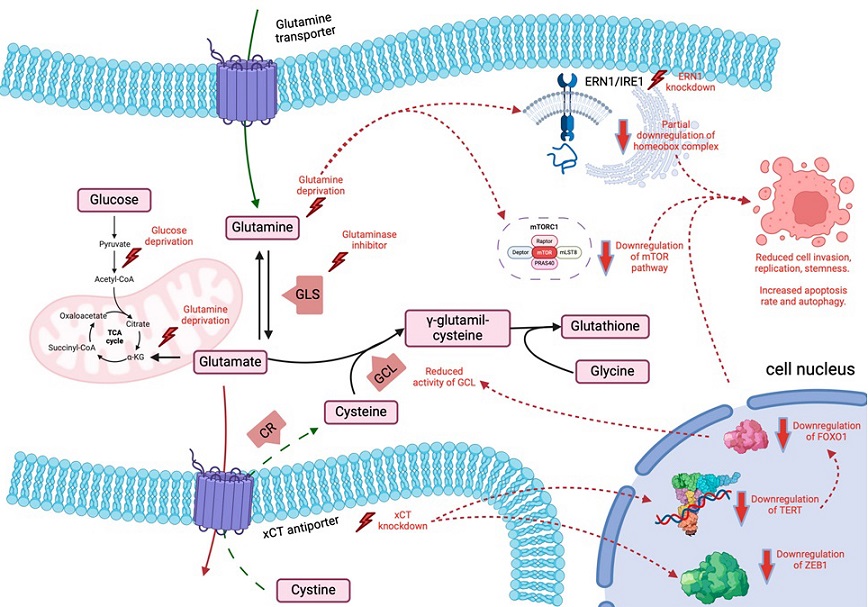Nikhil Prasad Fact checked by:Thailand Medical News Team Oct 31, 2024 1 year, 3 months, 4 days, 2 hours, 36 minutes ago
Medical News: In a pioneering study, researchers from Imperial College School of Medicine and the Department of Brain Sciences at Imperial College London-UK have explored how depriving glioblastoma cells of specific amino acids could slow their growth. Glioblastoma, an aggressive brain cancer, is notorious for its resilience and limited treatment options, with current therapies showing minimal improvements in survival rates. The researchers, including Keven Du, Leila Grocott, Giulio Anichini, Kevin O'Neill, and Nelofer Syed, reviewed emerging findings on how essential amino acids like arginine, glutamine, methionine, and cysteine contribute to the tumor’s metabolic activities and survival.
 Schematics of the physiological role of glutamine and some pathways which are suspected to be affected by its deprivation in glioblastoma. GLS—Glutaminase; CR—Cystine Reductase; GCL—Glutamine–Cysteine Ligase.
Understanding Glioblastoma’s Amino Acid Needs
Schematics of the physiological role of glutamine and some pathways which are suspected to be affected by its deprivation in glioblastoma. GLS—Glutaminase; CR—Cystine Reductase; GCL—Glutamine–Cysteine Ligase.
Understanding Glioblastoma’s Amino Acid Needs
This
Medical News report reveals that glioblastoma cells are especially dependent on certain amino acids for survival and growth. These amino acids fuel the tumor’s cellular activities, supporting both its survival and the complex interactions within the tumor microenvironment. Recent studies show that depriving these cells of key amino acids, including arginine and glutamine, disrupts essential metabolic pathways, leading to cellular stress and apoptosis, or programmed cell death.
The current study emphasizes that when glioblastoma cells face a shortage of amino acids, they activate adaptive responses to combat this deficiency. Such adaptability poses a challenge for therapeutic strategies, as the tumors can sometimes continue to thrive even under deprivation conditions.
Targeting Amino Acids: Key Findings from the Study
The research highlights specific findings regarding each amino acid’s role and potential impact on glioblastoma treatment:
-Arginine: Glioblastomas lacking an enzyme called arginosuccinate synthetase 1 (ASS1) are particularly vulnerable to arginine deprivation. These tumors rely on external sources of arginine and are therefore sensitive to treatments using arginine-depleting agents like ADI-PEG20. Arginine deprivation not only affects tumor cell survival but also alters their adhesion to surrounding cells. This change reduces tumor invasiveness and influences structural integrity, leading to a reduction in cell growth. Researchers noted that this process enhances the cells' susceptibility to apoptosis, especially when combined with anti-cancer drugs or therapies like radiation.
-Glutamine: Often regarded as a critical nutrient in cancer cell metabolism, glutamine plays a vital role in energy production and cellular repair in glioblastomas. The study shows that when deprived of glutamine, glioblastoma cells exhibit reduced proliferation and increased levels of autophagy, a process in which cells recycle their components to survive nutrient stress. Glutamine
deprivation also affects the tumor's ability to maintain its energy production, ultimately leading to cell death in nutrient-poor environments. In clinical settings, combining glutamine deprivation with inhibitors targeting the mTOR pathway shows promise in halting tumor growth.
-Methionine and Cysteine: These amino acids are involved in DNA methylation and antioxidant production. Methionine deprivation, in particular, disrupts methylation processes, affecting gene expression in glioblastoma cells.
Methionine and cysteine also contribute to the tumor's resilience by preventing lipid peroxidation, a process leading to cell death through oxidative stress. Their deprivation induces ferroptosis, a form of cell death related to lipid peroxidation, making methionine and cysteine key targets for potential therapies.
Challenges and Future Directions
While amino acid deprivation shows promise, researchers note several challenges that need addressing. Glioblastoma cells often activate compensatory mechanisms to survive nutrient deprivation. For example, glutamine-deprived glioblastoma cells can switch their metabolic pathways to use alternative sources of energy, which complicates the treatment process.
The microenvironment around glioblastomas, including immune cells like macrophages, also responds to amino acid deprivation in complex ways. For instance, arginine deprivation may influence immune cells to adopt an anti-tumor stance, but this effect varies widely based on specific tumor characteristics.
Study Conclusions
The study concludes that amino acid deprivation represents a viable strategy for glioblastoma treatment by limiting essential nutrients that tumors depend on for survival. However, a tailored approach is essential due to the tumor's adaptive mechanisms. Arginine and glutamine deprivation were found particularly promising, with studies indicating that combinations of deprivation therapies and drugs targeting metabolic pathways could enhance their efficacy.
Further research is necessary to refine these approaches, optimize combination therapies, and account for the tumor's adaptive mechanisms and interactions with surrounding immune cells. Ultimately, the findings underscore the potential of amino acid deprivation as part of a broader strategy to develop more effective, targeted treatments for glioblastoma.
The study findings were published in the peer-reviewed journal Biomedicines.
https://www.mdpi.com/2227-9059/12/11/2481
For the latest on Glioblastoma, keep on logging to Thailand
Medical News.
Read Also:
https://www.thailandmedical.news/news/glioblastoma-may-weaken-key-immune-cells
https://www.thailandmedical.news/news/napabucasin-shows-promise-for-glioblastoma
https://www.thailandmedical.news/news/natural-compounds-show-promise-as-adjuvants-for-glioblastoma
https://www.thailandmedical.news/news/new-hope-for-glioblastoma-treatment-orladeyo-shows-promise-in-reducing-cerebral-edema
https://www.thailandmedical.news/news/a-new-promising-treatment-protocol-for-aggressive-type-of-malignant-brain-tumor
https://www.thailandmedical.news/news/university-of-mississippi-study-shows-that-juice-of-the-cornelian-cherry-can-help-with-glioblastoma
https://www.thailandmedical.news/news/hyperbaric-oxygen-aid-existing-treatments-against-brain-cancer
https://www.thailandmedical.news/news/metformin-shows-potential-as-an-angiogenic-supplemental-adjuvant-for-glioblastoma-treatment
https://www.thailandmedical.news/news/overcoming-drug-resistance-in-glioblastoma-the-promise-of-pi3k-beta-inhibitors
https://www.thailandmedical.news/news/herbs-and-phytochemicals-bioactive-compounds-from-kiwiberry-found-to-be-useful-in-treating-glioblastoma
https://www.thailandmedical.news/news/breaking-texas-md-anderson-study-finds-that-covid-19-accelerates-brain-tumor-progression-and-possibly-causes-new-onset-glioblastomas
https://www.thailandmedical.news/news/breaking-covid-19-news-study-finds-that-covid-19-hospitalization-linked-to-elevated-glioblastoma-risk-a-type-of-aggressive-brain-cancer
https://www.thailandmedical.news/news/new-combo-therapy-for-glioblastoma
https://www.thailandmedical.news/news/brain-cancer-study-shows-lumefantrine-enhances-current-protocol-to-treat-glioblastoma-multiforme-gbm
https://www.thailandmedical.news/news/sars-cov-2-and-cancer-increased-neuropilin-1-expression-as-a-result-of-covid-19-can-lead-to-progression-of-primary-brain-tumors-besides-neurological-i
